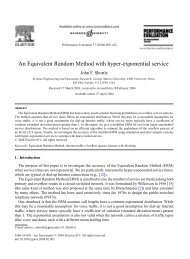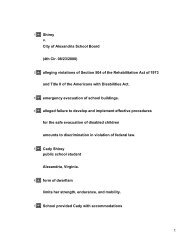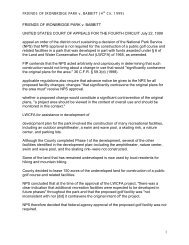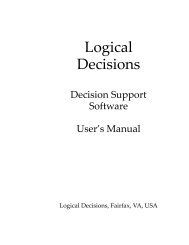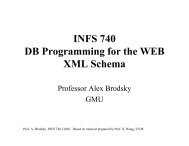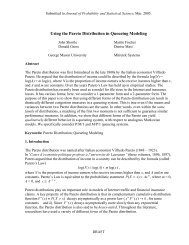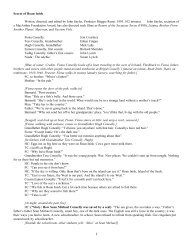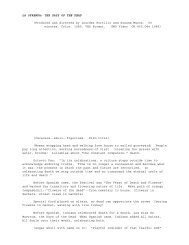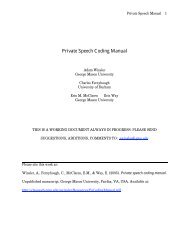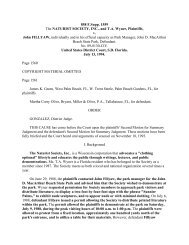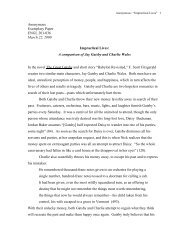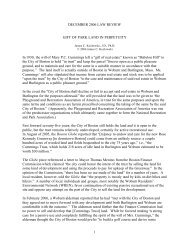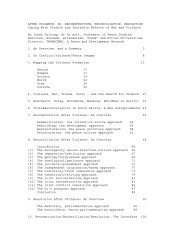"Powerpuff" Football Injury Darrow v. South Huntington School District
"Powerpuff" Football Injury Darrow v. South Huntington School District
"Powerpuff" Football Injury Darrow v. South Huntington School District
Create successful ePaper yourself
Turn your PDF publications into a flip-book with our unique Google optimized e-Paper software.
George Mason University <strong>School</strong> of Recreation, Health & Tourism Court Reports<br />
<strong>Darrow</strong> v. <strong>South</strong> <strong>Huntington</strong> <strong>School</strong> <strong>District</strong>, 2007 NY Slip Op 31297 (5/14/2007)<br />
NO EVIDENCE OF NEGLIGENCE IN “POWDERPUFF” FOOTBALL INJURY<br />
DARROW v. SOUTH HUNTINGTON SCHOOL DISTRICT<br />
Supreme Court of the State of New York, Suffolk County.<br />
May 14, 2007<br />
[Note: Attached opinion of the court has been edited and citations omitted.]<br />
This action arises out of a negligent supervision claim against the <strong>District</strong> by plaintiff Gail<br />
<strong>Darrow</strong> on behalf of her minor daughter Tara Lynn <strong>Darrow</strong> who sustained personal injuries on<br />
October 12, 2004 during her voluntary participation in a homecoming event known as the<br />
"Powder Puff" football game. Plaintiffs allege that the <strong>District</strong> was negligent in failing to<br />
properly and safely supervise the Powder Puff girl's football event and in failing to provide<br />
adequate personnel and equipment to insure the safety of the participants. The plaintiff's mother,<br />
plaintiff Gail <strong>Darrow</strong>, also brings a claim for loss of services.<br />
Defendant now moves for summary judgment on the grounds the <strong>District</strong> did not breach its duty<br />
to provide adequate supervision, plaintiff's injuries were not proximately related to any alleged<br />
lack of supervision by the defendant district, and notwithstanding any alleged lack of<br />
supervision, the defendant is entitled to dismissal under the assumption of risk doctrine. In<br />
support, defendant submits, inter alia, the pleadings, the municipal hearing deposition testimony<br />
of plaintiff, of defendant's representatives, Eric Caballero, AnnMarie Bunce, and Jonathan<br />
Varlamos.<br />
Plaintiff was born on March 31, 1987, and was a senior and member of the varsity tennis team at<br />
Walt Whitman high <strong>School</strong> on the date of the accident. She testified that the accident occurred<br />
during the Powder puff football game traditionally held in connection with homecoming<br />
weekend. She had participated in this event the previous year. Plaintiff explained it was a "two<br />
hand touch" game; the different positions included a "hiker", a quarterback, a running back,<br />
receivers, and blockers. Offensive players were allowed to impede the progress of defensive<br />
players, but intentional shoving or pushing was prohibited. Each team had a captain and the girls<br />
would decide amongst themselves who would play each position. Additionally, each team had a<br />
member of the faculty who served as the coach. Assistant principal Jonathan Varlamos was<br />
assigned to the senior team. Plaintiff testified the coach would "supervise and hype the team up<br />
and keep everyone off the field". Two referees were present on the field and other school<br />
officials were present to supervise. Plaintiff attended a voluntary practice a few days prior to the<br />
game.<br />
On the date of the accident, plaintiff testified the game began around 7:00-7:30 p.m. The weather<br />
was sunny, a little cool, and not raining. She testified the football field was somewhat dewy as it<br />
usually gets at night. Some people had slipped, without injury, prior to plaintiff’s accident.<br />
Plaintiff testified that her accident happened very quickly and she could only recall very little.<br />
She testified that she attempted to avoid the block of an opposing player, but that player pushed<br />
her shoulder into plaintiff and she fell to the ground. Neither plaintiff, or any of the other players,<br />
were wearing cleats.<br />
© 2007 James C. Kozlowski 1
George Mason University <strong>School</strong> of Recreation, Health & Tourism Court Reports<br />
<strong>Darrow</strong> v. <strong>South</strong> <strong>Huntington</strong> <strong>School</strong> <strong>District</strong>, 2007 NY Slip Op 31297 (5/14/2007)<br />
The school's physical education teacher, Eric Caballero, who was a referee, testified he had been<br />
employed by the school as a physical education teacher for the <strong>District</strong> for two years prior to<br />
plaintiff’s accident. He was also employed by the <strong>District</strong> as the junior varsity soccer coach and<br />
was currently the assistant men's basketball coach at SUNY Farmingdale. He had been asked by<br />
Ms. AnnMarie Bunce, the director of the general student organization ("GSO") at Walt Whitman<br />
High <strong>School</strong> to referee. Cabellero testified that this was the second year he served as a referee for<br />
the game. He noted he was not aware of any injuries the previous year.<br />
According to Caballero, his responsibilities as referee included counting the number of players<br />
on the field, placing the ball, and ensuring safe play. He testified he had discussed the rules of<br />
the game and scoring ,system with Bunce prior to the game. Caballero testified the event was to<br />
be a "one hand touch" game, meaning that if the ball carrier was touched by a player on the other<br />
team with one hand, the play would be ruled dead. As a result of that rule, the game was intended<br />
to be essentially "non-contact". However, if the referee(s) determined that a player used<br />
unauthorized contact, a penalty would be assessed. In addition to the two referees, Caballero<br />
testified the school's administrative staff, the athletic trainer, and other personnel acting as<br />
chaperones were present during the game. According to Caballero, the football field was lit, the<br />
grass itself was slightly damp, but the playing surface was level. He did not recall anyone getting<br />
hurt during the game, including plaintiff, or calling any penalties for illegal contact.<br />
The school's GSO adviser/teacher, AnnMarie Bunce testified that she was responsible for<br />
running the 2004 homecoming activities, including the powder puff football game. She has been<br />
a teacher in the <strong>District</strong> for nineteen years and adviser to the GSO for three. Prior to the game,<br />
she had a mandatory meeting for all girls who wished to play during which the game was<br />
explained, rules distributed, and captains were selected. If a player could not attend the meeting,<br />
she was required to meet with her individually. She testified that she, assistant principals<br />
Jonathan Varlamos and Jerry Lesperance, school principal Mr. Polansky, the deans of discipline,<br />
and other teachers and security were all present at the game. Bunce did not witness the accident.<br />
She testified the game was stopped because a girl was "down", presumably plaintiff.<br />
Assistant principal Jonathan Varlamos acted as an honorary coach for the game. Prior to the<br />
game, Varlamos was provided with the rules by Ms. Bunce and the two of them discussed some<br />
of the specifics the day before. Although Ms. Bunce requested that ten teachers serve as<br />
chaperones for the game, Varlamos secured twelve. He testified it was a beautiful fall evening<br />
and no penalties were called on either team. Although he did not see the actual play where<br />
plaintiff was injured, Varlamos recalled seeing a young lady (now known to him as the plaintiff)<br />
sitting on the bench with the trainer during the third quarter. The trainer indicated she would be<br />
"okay".<br />
Although schools are under a duty to adequately supervise the students in their charge and will<br />
he held liable for foreseeable injuries proximately related to the absence of adequate supervision,<br />
they are not insurers of the safety of their students, for they cannot be reasonably expected to<br />
continuously supervise and control all of the students' movements and activities. To find that a<br />
school breached its duty to provide adequate supervision in the context of injuries caused by the<br />
acts of fellow students, a plaintiff must show that the school had sufficiently specific knowledge<br />
or notice of the dangerous conduct which caused injury, that is, that the third-party acts could<br />
© 2007 James C. Kozlowski 2
George Mason University <strong>School</strong> of Recreation, Health & Tourism Court Reports<br />
<strong>Darrow</strong> v. <strong>South</strong> <strong>Huntington</strong> <strong>School</strong> <strong>District</strong>, 2007 NY Slip Op 31297 (5/14/2007)<br />
reasonably have been anticipated. An injury caused by the impulsive, unanticipated act of a<br />
fellow student ordinarily will not give rise to a finding of negligence absent proof of prior<br />
conduct that would have put a reasonable person on notice to protect against the injury-causing<br />
act. Moreover, where an accident occurs in so short a span of time that even the most intense<br />
supervision could not have prevented it, the school's lack of supervision cannot be the proximate<br />
cause of the injury, and summary judgment must be granted in its favor.<br />
Further, while students voluntarily participating in an interscholastic sport are deemed to have<br />
assumed the risks of those injuries that are known, apparent or reasonably foreseeable<br />
consequences of their participation, assumption of the risk is not an absolute defense as schools<br />
are still obligated to exercise ordinary reasonable care to protect students from unassumed,<br />
concealed or unreasonably increased risks. Likewise, participants in interscholastic sport may not<br />
be held to have consented to injurious acts from other athletes which are reckless or intentional.<br />
Defendant <strong>School</strong> <strong>District</strong> has demonstrated its entitlement to summary judgment as a matter of<br />
law by demonstrating that it neither had sufficient specific knowledge of the dangerous conduct<br />
which caused plaintiff's injuries or that its actions were the proximate cause of those injuries.<br />
The accident occurred when there was sudden and spontaneous contact between plaintiff and a<br />
fellow student, not because of inadequate supervision by any of the <strong>District</strong> personnel present.<br />
Clearly, there were numerous teachers, chaperones and supervisory personnel present at the<br />
game including two experienced staff members serving as referees, and two serving as coaches.<br />
A meeting was held with the participants prior to the game explaining the rules of the game. The<br />
playing field was properly lit and maintained. Furthermore, even assuming arguendo that the<br />
school did breach its supervisory duty, the conduct that caused plaintiff's injuries was so sudden<br />
and spontaneous, and occurred in so short a span of time, that even the most intense supervision<br />
could not have prevented it. The evidence establishes a sudden and unfortunate contact in the<br />
middle of the field during one play by two competing students. Each student essentially tried to<br />
get around the other and came into contact. Therefore, the school's alleged lack of supervision<br />
cannot be said to be the proximate cause of the injury and defendant has established its<br />
entitlement summary judgment.<br />
In opposition, plaintiffs argue that it was not a lack of supervision during the game that led to the<br />
injury, but a lack of proper oversight before the game and lack of proper attention to setting<br />
safety parameters; specifically, defendants refusal to allow students to wear cleats during the<br />
game given the damp field conditions and failing to properly instruct the students on proper<br />
techniques.<br />
It is well settled that conclusory allegations or unsubstantiated assertions may not defeat a<br />
motion for summary judgment. Plaintiff has never claimed she fell because she lost her footing<br />
or that cleats would have prevented her fall. Speculation, grounded in theory rather than fact, is<br />
insufficient to defeat a motion for summary judgment. The plaintiff, in the exercise of her<br />
discretion, participated in a voluntary sporting event, aware of the risks inherent in the game<br />
having participated the year before. The game was meticulously planned, organized and<br />
supervised by the <strong>District</strong>. The occurrence of an accident during the normal course of an extracurricular<br />
"one-hand touch" football game is not probative of negligence.<br />
© 2007 James C. Kozlowski 3
George Mason University <strong>School</strong> of Recreation, Health & Tourism Court Reports<br />
<strong>Darrow</strong> v. <strong>South</strong> <strong>Huntington</strong> <strong>School</strong> <strong>District</strong>, 2007 NY Slip Op 31297 (5/14/2007)<br />
Accordingly, defendant <strong>School</strong> <strong>District</strong>'s motion for summary judgment dismissing plaintiffs'<br />
complaint is granted.<br />
© 2007 James C. Kozlowski 4



